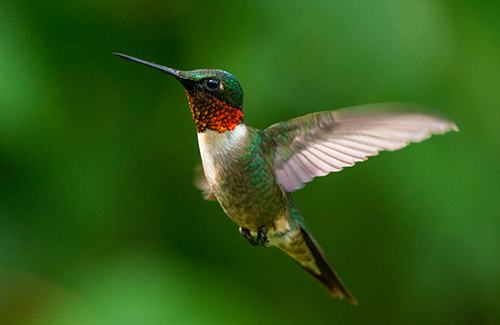Nurturing Hummingbirds Through Spring Migration
Apr 08, 2024

Springtime in Tennessee heralds the arrival of one of nature’s most enchanting creatures: the ruby-throated hummingbird. These tiny birds migrate through the state from late March to mid-May, traveling thousands of miles to reach their breeding grounds in the Northern states from Central America and Mexico. While some may linger year-round, it’s during this peak migration period that the skies come alive with their vibrant hues.
As they make their way across the Gulf of Mexico, hummingbirds arrive in Tennessee exhausted and in need of replenishment. Here are several tips for supporting hummingbirds during their migration.
Feeding Hummingbirds
Creating a welcoming habitat for hummingbirds begins with providing a reliable food source. Hummingbirds primarily feed on nectar from flowers, but they readily visit feeders filled with sugar water, especially during their migration when natural nectar sources may be scarce. Here’s how to set up a hummingbird feeder:
Creating a Hummingbird-Friendly Garden
In addition to feeders, cultivating a hummingbird-friendly garden can provide essential foraging opportunities for these tiny visitors. Here are some tips for designing a garden that appeals to hummingbirds:
Through our efforts to provide nourishment and shelter, we play a vital role in supporting hummingbirds’ journey through the state. Many of our Co-ops are stocked with hummingbird feeders and supplies to help you in this endeavor — simply click here to find the nearest location!
For more content like this, check out the latest issue of The Cooperator.
As they make their way across the Gulf of Mexico, hummingbirds arrive in Tennessee exhausted and in need of replenishment. Here are several tips for supporting hummingbirds during their migration.
Feeding Hummingbirds
Creating a welcoming habitat for hummingbirds begins with providing a reliable food source. Hummingbirds primarily feed on nectar from flowers, but they readily visit feeders filled with sugar water, especially during their migration when natural nectar sources may be scarce. Here’s how to set up a hummingbird feeder:
- Choose the right feeder: Opt for a feeder with bright red coloring to attract hummingbirds, as they are drawn to vibrant hues. Select a feeder with multiple ports to accommodate several birds simultaneously.
- Prepare sugar water: Mix one part of white granulated sugar with four parts of water to create a simple nectar solution. Avoid using honey, artificial sweeteners, or food coloring, as these can be harmful to hummingbirds.
- Hang the feeder: Place the feeder in a shaded area away from direct sunlight to prevent the nectar from spoiling too quickly. Ensure the feeder is easily accessible and positioned at a height that allows for easy refilling and cleaning.
- Maintain cleanliness: Regularly clean the feeder with hot water and mild detergent to prevent the growth of mold and bacteria. Rinse thoroughly before refilling with fresh nectar.
Creating a Hummingbird-Friendly Garden
In addition to feeders, cultivating a hummingbird-friendly garden can provide essential foraging opportunities for these tiny visitors. Here are some tips for designing a garden that appeals to hummingbirds:
- Plant native flowers: Choose a variety of native plants with tubular-shaped flowers, such as trumpet vine, bee balm, and cardinal flower, which are particularly attractive to hummingbirds.
- Provide perches: Place small branches or decorative perches near feeders and flowers. Hummingbirds expend a significant amount of energy in flight and appreciate perches where they can rest and survey their surroundings.
- Maintain a water source: Install a shallow birdbath or fountain where hummingbirds can bathe and drink. Ensure the water is clean and changed regularly to prevent contamination.
Through our efforts to provide nourishment and shelter, we play a vital role in supporting hummingbirds’ journey through the state. Many of our Co-ops are stocked with hummingbird feeders and supplies to help you in this endeavor — simply click here to find the nearest location!
For more content like this, check out the latest issue of The Cooperator.